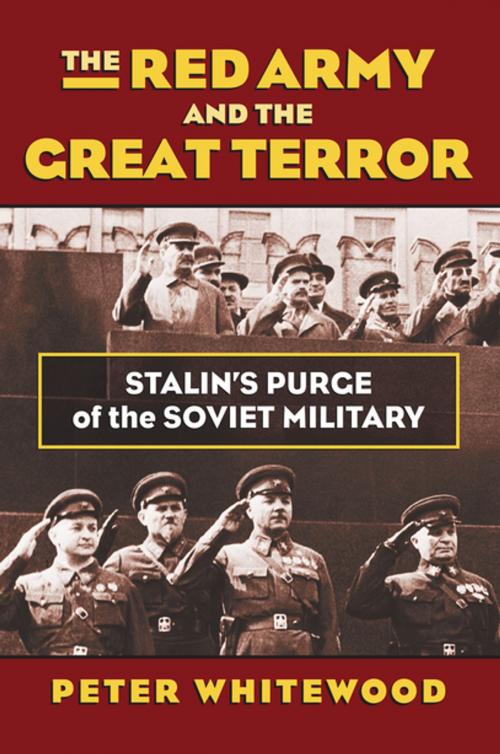The Red Army and the Great Terror
Stalin's Purge of the Soviet Military
Nonfiction, History, Asian, Russia| Author: | Peter Whitewood | ISBN: | 9780700621699 |
| Publisher: | University Press of Kansas | Publication: | October 25, 2015 |
| Imprint: | University Press of Kansas | Language: | English |
| Author: | Peter Whitewood |
| ISBN: | 9780700621699 |
| Publisher: | University Press of Kansas |
| Publication: | October 25, 2015 |
| Imprint: | University Press of Kansas |
| Language: | English |
On June 11, 1937, a closed military court ordered the execution of a group of the Soviet Union's most talented and experienced army officers, including Marshal Mikhail Tukhachevskii; all were charged with participating in a Nazi plot to overthrow the regime of Joseph Stalin. There followed a massive military purge, from the officer corps through the rank-and-file, that many consider a major factor in the Red Army's dismal performance in confronting the German invasion of June 1941. Why take such action on the eve of a major war? The most common theory has Stalin fabricating a "military conspiracy" to tighten his control over the Soviet state. In The Red Army and the Great Terror, Peter Whitewood advances an entirely new explanation for Stalin's actions—an explanation with the potential to unlock the mysteries that still surround the Great Terror, the surge of political repression in the late 1930s in which over one million Soviet people were imprisoned in labor camps and over 750,000 executed.
Framing his study within the context of Soviet civil-military relations dating back to the 1917 revolution, Whitewood shows that Stalin sanctioned this attack on the Red Army not from a position of confidence and strength, but from one of weakness and misperception. Here we see how Stalin's views had been poisoned by the paranoid accusations of his secret police, who saw spies and supporters of the dead Tsar everywhere and who had long believed that the Red Army was vulnerable to infiltration by foreign intelligence agencies engaged in a conspiracy against the Soviet state. Recently opened Russian archives allow Whitewood to counter the accounts of Soviet defectors and conspiracy theories that have long underpinned conventional wisdom on the military purge. By broadening our view, The Red Army and the Great Terror demonstrates not only why Tukhachevskii and his associates were purged in 1937, but also why tens of thousands of other officers and soldiers were discharged and arrested at the same time. With its thorough reassessment of these events, the book sheds new light on the nature of power, state violence, and civil-military relations under the Stalinist regime.
On June 11, 1937, a closed military court ordered the execution of a group of the Soviet Union's most talented and experienced army officers, including Marshal Mikhail Tukhachevskii; all were charged with participating in a Nazi plot to overthrow the regime of Joseph Stalin. There followed a massive military purge, from the officer corps through the rank-and-file, that many consider a major factor in the Red Army's dismal performance in confronting the German invasion of June 1941. Why take such action on the eve of a major war? The most common theory has Stalin fabricating a "military conspiracy" to tighten his control over the Soviet state. In The Red Army and the Great Terror, Peter Whitewood advances an entirely new explanation for Stalin's actions—an explanation with the potential to unlock the mysteries that still surround the Great Terror, the surge of political repression in the late 1930s in which over one million Soviet people were imprisoned in labor camps and over 750,000 executed.
Framing his study within the context of Soviet civil-military relations dating back to the 1917 revolution, Whitewood shows that Stalin sanctioned this attack on the Red Army not from a position of confidence and strength, but from one of weakness and misperception. Here we see how Stalin's views had been poisoned by the paranoid accusations of his secret police, who saw spies and supporters of the dead Tsar everywhere and who had long believed that the Red Army was vulnerable to infiltration by foreign intelligence agencies engaged in a conspiracy against the Soviet state. Recently opened Russian archives allow Whitewood to counter the accounts of Soviet defectors and conspiracy theories that have long underpinned conventional wisdom on the military purge. By broadening our view, The Red Army and the Great Terror demonstrates not only why Tukhachevskii and his associates were purged in 1937, but also why tens of thousands of other officers and soldiers were discharged and arrested at the same time. With its thorough reassessment of these events, the book sheds new light on the nature of power, state violence, and civil-military relations under the Stalinist regime.















